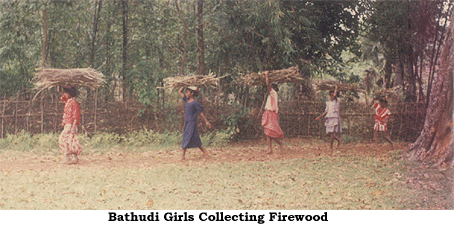|
The Bathudi are recognized as a tribe, though in belief and practices they appear to be a Hindu caste. They are dark complexioned medium height settled cultivators occupying the plain-land areas in Central to North Orissa (Keonjhar and Mayurbhanj district). They claim to be descendants of great warriors who, in past, successfully defended their territory against the Kharia and the Gond invaders. Probably, these people were the militia of the Hindu local Kings and since then lost their own mother tongue and animistic religion. The Bathudi people enjoyed cultivable land and their chiefs became powerful under the princely rulers. They still have their weapons like swords, spears, bows and arrows. Different rituals of Bathudi are conducted by Brahmin priest, marking their Hinduization. They have several exogamous ‘gotra’ or clans named like the Hindu castes and community functionaries who guide them in social matters. Yet they maintain distinct social identity. The legends on their origin indicate their uniqueness. Some such legends appear in this issue courtesy The Biyot Tripathy Collection.

As against a large tribal community like Bathudi of Orissa, the Toto of Bengal are numerically very samll and limited to the hilly terrains of North Bengal. In fact they are facing extinction and have attracted the attention of various development agencies. Manas Chowdhuri's article in this issue throws some light into their living conditions and problems thereof.
No tribe is without its dance and music, rather the tribes can be differentiated on the basis of their dance forms. In the article the Rythms in the Hills by Rabi Narayana Dash, the intricacies of the tribal dances have been dealt that reveal the relationship between the dance forms with the earlier forms of tribal subsistence.
In between the numerical strengths of the Bathudi and the Toto, lies the dwindling population of Bondo hill dwellers of Koraput district of Orissa. They have so long lived a secluded life, shrouded in mystery. They never liked intruders and caused fear in the outsiders. It is long time since Verrier Elwin entered their territory in mid-twentieth century. In the article Ethnographic Profile of High land Bonda of Orissa , Ramesh Prasad Mohanty has provided a glimpse into social, cultural and economic aspects of Bonda life.
The interesting aspects of tribal population of Orissa relating to their health have been highlighted by Bipin Bihari Hota in his article in this issue.
|

Shambhunath Naik
Member, Orissa Legislative Assembly
Constituency: Jashipur, Mayurbhanj
Three times MLA (1985-90, 1995-2000, 2004 - )
Mr. Naik belongs to Bathudi community and thus he speaks:
"I believe in Marxism and belong to the political party Socialist Unity Centre Of India (SUCI). I fight against exploitation. I take up their causes who are neglected materially and whose human dignity is violated."
" In my opinion, the eviction of tribal people from the lands on which they have been depending for their livelihood is the most pressing problem"
"In Orissa Assembly, I have taken up the issues not only of tribals but also the issues involving the interest of the people of Orissa mainly the ones related to education."
|


